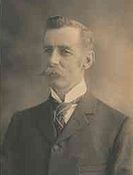South Australian state election, 1906
|
|
|||||||||||||||||||||||||||||||||||||||||||||
|---|---|---|---|---|---|---|---|---|---|---|---|---|---|---|---|---|---|---|---|---|---|---|---|---|---|---|---|---|---|---|---|---|---|---|---|---|---|---|---|---|---|---|---|---|---|
|
|||||||||||||||||||||||||||||||||||||||||||||
|
All 42 seats in the South Australian House of Assembly 22 seats were needed for a majority |
|||||||||||||||||||||||||||||||||||||||||||||
|
|||||||||||||||||||||||||||||||||||||||||||||
|
|||||||||||||||||||||||||||||||||||||||||||||
State elections were held in South Australia on 3 November 1906, apart from the Northern Territory, which voted on 10 November. This was a double dissolution election, and in the South Australian House of Assembly, all 42 seats were up for election. The incumbent United Labor Party (ULP) government led by Premier of South Australia Thomas Price with coalition partner the Liberal and Democratic Union (LDU) led by Archibald Peake, defeated the conservative opposition led by Leader of the Opposition Richard Butler. Each of the 13 districts elected multiple members, with voters casting multiple votes.
The ULP became part of a unique "lab-lib" government, the Price-Peake administration minority government, following the 1905 election. The ministry was a coalition between the ULP led by Price, and the liberal group led by Peake. The deadlock over the franchise issue continued with the Legislative Council. After yet another attempt at reform, rejected by the Council, Price resigned his ministry, but when Butler, as leader of the opposition, was unable to form a ministry, Price/Peake remained in office. After more conflict with the Council, Price and Peake obtained an early election, and campaigned as a "ministerial alliance". At the same time, Peake agreed to pressure from within his group to form a new party – the Liberal and Democratic Union (LDU). This drew its membership from small wheat farmers, and at this stage, the LDU was firmly in favour of franchise reform, willing to be in coalition with the ULP, and opposed to both the conservative Australasian National League (ANL) and the Farmers and Producers Political Union (FPPU).
...
Wikipedia



